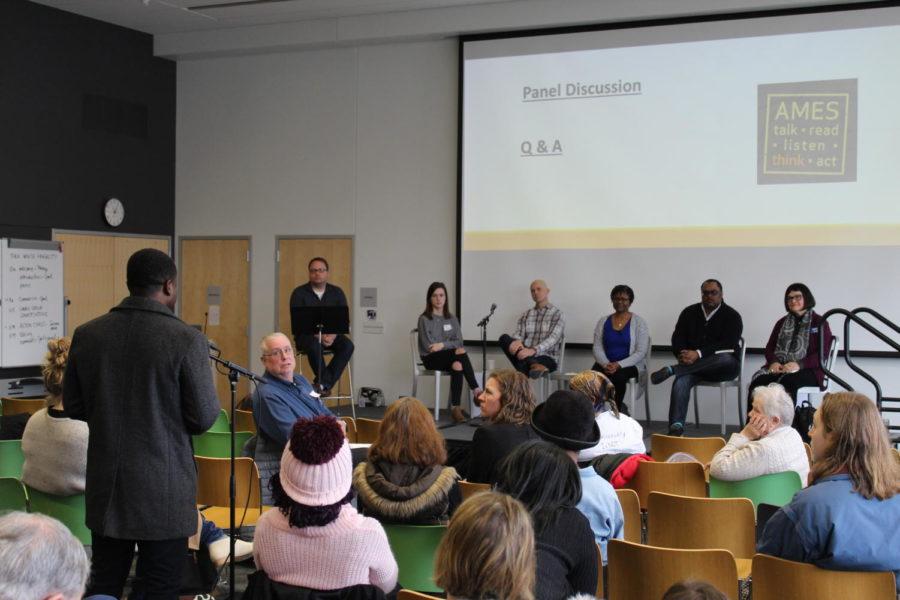White fragility lecturer speaks to Ames community members
Audience members were invited to ask panelists questions during an open question and answer segment.
March 10, 2019
Members of the Ames and Iowa State community continued discussions of race and white fragility Saturday.
As a part of a collaborative series with Iowa State Lectures, the Ames Public Library hosted a panel discussion framed around the book “White Fragility: Why It’s So Hard for White People to Talk about Racism,” by Robin DiAngelo. DiAngelo lectured, at Iowa State, about her book and white fragility on Feb. 26, and this event marked the third instance Iowa State and the library have held a partner event in this format. Roughly 70 people came to the Ames Public Library to attend the event.
Panelists were given a series of questions from Joel Hochstein, moderator and chair of the Ames Human Relations Commission. The questions were based on DiAngelos book, featuring direct quotes or excerpts alongside the question.
Abdullah Muhammad, panelist, antiracist educator and Ames community member, said he appreciated that the questions and discussions were all closely connected to DiAngelo’s work, keeping discussions on topic.
“Even though the topic is white fragility and it’s a book talk and we want to stick to the message of the book, because this topic is so loaded, people still find every opportunity they can to not talk about the main thing,” Muhammad said.
Panelists discussed how they see white supremacy play out in society. Mary Munteh, panelist, former nun and CEO of a company called Success Coach, said she saw white supremacy in her religious upbringing.
Munteh said she saw white supremacy being perpetuated in the churches she grew up attending, where God, Jesus and Mary were all depicted as white, and as a child, she believed God was white and male.
“That translated into internalizing the fact that anybody who looked like that image that I saw was closer to God than I was,” Munteh said.
White supremacy, Muhammad said, is something he sees almost everywhere in his day-to-day life.
“All of our systems and institutions and organizations bend really heavily toward white supremacy,” Muhammad said. “I see it in my own communities, I see it in churches I’ve attended, I see it in the jobs that I’ve held, I see it in the jobs that I maybe haven’t gotten, so, I see it everywhere.”
James Webb, panelist and Ames High teacher, said that oftentimes he sees well meaning white liberals and progressives limit discussions on race by avoiding talks of race and racism by using niceness.
Panelists also discussed the white people co-opting the activism of Martin Luther King Jr. to uphold colorblind racism, specifically King’s statement about judging people by the content of their character rather than the color of their skin.
Josie Taylor, Ames high school student, said she believes white people will often do this to find an easy response to discomfort relating to conversations about race and racism.
“I think white people, a lot of times, we just focus on what we want to hear,” Taylor said. “We just hear that one part of what [King] said, we pick the easiest parts too, I think, it’s super easy and simple to just say ‘I’m gonna pretend that racism doesn’t exist, I’m gonna pretend we’re all the same color,’ because then you don’t have to do anything, you don’t have to get out of your comfort zone and make yourself, you know, feel any kind of discomfort.”
Rev. Deborah Hill-Davis, panelist and minister at the Unity church in Ames, said it is important, as a white person, to be able to accept being called out for participating in racism.
Hill-Davis described her first time being called out, when she was a school psychiatrist. She said her first instinct was to hide behind her credentials, but Hill-Davis said she asked the colleague to teach her about why what she did was wrong, listened and did her own reading to learn more.
Attendees broke into small groups after the panel to discuss, among other things, their own plans on how they would apply the takeaways of their discussions and the points of the panelists in the form of action plans. Attendees wrote out their action plans on two pieces of paper, one to keep for themselves, and one which they handed in to have read aloud.
Eboni Brown, an Ames community member and library employee, said she appreciated the action-oriented structure of the small group discussions.
“I liked that there were action steps, that people are thinking about ways they can engage with this outside of the program,” Brown said. “I think that’s important for walking the walk, I guess.”
The event also featured an open question and answer segment, where audience members could ask their own questions for the panelists to respond to.







